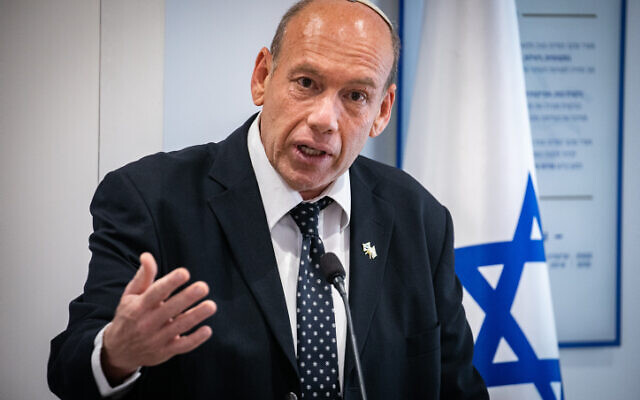Stark figures released on Monday by the State Comptroller’s Office revealed the high percentage of women subjected to sexual harassment or abuse while performing their obligatory national service in the Israel Police, Border Police and Israel Prison Service.
The report was largely based on a survey of conscripts in the three forces.
Such harassment is for the most part committed by professional, non-conscripted members of those forces including commanders, the comptroller’s report found, and when reported is either insufficiently addressed or not dealt with at all.
The report was commissioned in the wake of the so-called pimping scandal at Gilboa Prison, in which senior prison officers were accused of “pimping” out female prison officials in 2018 to prisoners held for nationalistic crimes.
The central findings of the report showed that fully 25 percent of conscripted women performing their obligatory service, typically beginning at age 18, have experienced sexual misconduct.
Get The Times of Israel's Daily Edition by email and never miss our top stories
State Comptroller Matanyahu Englman said the report painted a “troubling institutional reality” in the three services under review.
“It appears that the Gilboa scandal was just the tip of the iceberg. Conscripted soldiers are subject to harassment from terror inmates and from professional personnel who take advantage of conscripts’ weakness,” said Englman.
“A situation in which one in every four female soldiers performing national service in the police and prison service experience sexual abuse is unacceptable. We cannot forgive the fact that 70% of complaints were inadequately dealt with.”
The figure is highest in the Prison Service, where 38% of conscripts reported harassment or abuse, compared with 27% in the Border Police and 22% in the Israel Police.
In approximately 70% of the total cases, the victimizer was a professional, non-conscripted member of one of the forces. Still, a significant proportion of incidents were also committed by prisoners or civilian employees.

State Comptroller Matanyahu Englman, May 3, 2021. (Olivier Fitoussi/Flash90)
The percentage of conscripts who suffered harassment and abuse was far higher than their relative numbers in these services.
In the Israel Police for example, conscripts comprised 34% of all those complaining of sexual harassment, despite making up just 7% of all personnel, with almost identical figures for the Prison Service.
Of those who reported sexual harassment, some 70% said their complaint was either not dealt with at all (26%) or addressed insufficiently (44%).
The comptroller’s report on abuse in the three security forces, all of which come under the authority of the Public Security Ministry, was partially based on seven visits conducted by officials from the comptroller’s office to prisons that house terror convicts and conversations with 150 conscripts at those facilities.
In addition, the comptroller’s office sent an online questionnaire to 13,000 conscripts in the three services which was answered by 1,275 conscripts, male and female. Of the 644 women who answered the questionnaire, 161, or one in four, said that they had been sexually harassed or worse during the course of their 24-month service.
No firm definition of sexual harassment is laid out in the report, but the questionnaire asks “Did you experience any type of sexual offense during your service, including offers of sex or comments of a sexual nature.”

Security prisoners and jailers in Ofer Prison, Israel,August 20 2008. (Moshe Shai/FLASH90)
Testimony from those who reported incidents to the relevant authorities includes cases in which police officers were inappropriately touched by fellow police personnel, experienced sexually explicit comments and sexual advances of different kinds, and an “atmosphere of a sexual nature.”
Prison Service conscripts described terror inmates who committed indecent acts in front of them in their prison cell, and others who exposed themselves to the conscripts or made indecent comments to them.
In the police, 62% of those committing the harassment or abuse were professional members of the force, not including commanders, compared to 41% in the Border Police and 51% in the Prison Service.
Some 18% of sexual harassment or abuse incidents in the police were committed by commanders, compared to 21% in Border Police and 17% in the Prison Service.
And civilians along with prisoners were also a significant source of sexual harassment and abuse, responsible for 17% of such incidents in the police, 14% in the Border Police, and 24% in the Prison Service.
Englman said that the next public security minister — which appears likely to be the leader of the far-right Otzma Yehudit party Itamar Ben Gvir — would need to take “immediate measures” to address the problem.
The Israel Police (which oversees the Border Police) said in response that it views sexual harassment seriously, but insisted that all complaints of such harassment are “thoroughly examined and addressed appropriately.”
It added that “the increased reports… testify to an increase in awareness and a sense of trust and security of those serving and to zero tolerance toward police officers committing sexual harassment.”
The Israel Prison Service said it had taken steps to address sexual harassment and abuse, including the launch of a hotline for female prison officers and an organizational campaign “which actively engages in internal and continuous advocacy to create a protective and empowering work environment.”
The IPS added, however, that “there is no doubt that the findings of the state comptroller’s report show we have more work before us.”


